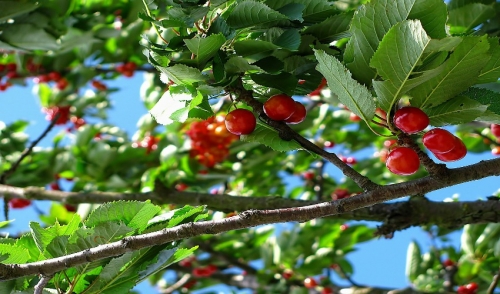{article.name}
Stay Informed
Grafting Fruit Trees

- Share this:
- Share on Facebook
- Pin on Pinterest
- Tweet on Twitter
Grafting is a useful technique to increase the hardiness of your fruit trees, but what is it and can you learn to do it even if you aren't a professional arborist?
About Grafting
Grafting is the process of combining two different trees to become one – the stock or root of one hardy tree with the healthy, viable buds and branches of another. This process can have many benefits for your trees, including…
- Reproducing fruit from the original tree, since many fruit seeds will not automatically produce the same fruit due to crossbreeding and cross-fertilization.
- Repairing damage or injuries to your trees without losing a tree completely, which could take several years to regrow from a young tree.
- Increasing a tree's durability and resistance to wind, ice, snow, pests or other threats by choosing hardy root stock and healthy scions (the branches that are grafted onto the root).
- Increasing the yield of a specific tree by experimenting with more productive scions that will produce greater amounts of fruit or may shorten fruit development times.
- Creating unique hybrid trees that can produce multiple varieties of fruit from the same root stock, thanks to different grafting experiments.
There are different types of grafting you can try depending on the types of trees you are grafting, the position of the grafts, tree ages, the types of cuts you use and what you hope to accomplish with the graft. The most common grafting techniques are…
- Whip
- Cleft
- Side
- Stub
- Bridge
- Budding
It is best to research individual types of grafting if you have a particular technique in mind, though many of the best practices for grafting are the same no matter which method you prefer.
Grafting Your Trees
Younger, vigorous, healthy trees respond best to grafting because they can better withstand the stress of the cuts and adjust to the new growth. To give your grafts the best chance of success…
- Cut your scions – the branches you hope to graft onto new stock – when the trees are dormant in the fall. This lessens the risk of shock and stress to the scions so they can rejuvenate better in their new location. Store them with the cut ends in a moist bed of moss or sawdust, but do not put them directly in water or the ends may rot. Keep them in a cool place until you are ready to position the grafts. If you will be grafting several types of trees at once, it is helpful to label the scions so you do not mix them up and pair them with less appropriate stock.
- Plan to do your grafting in the spring when the buds of your stock just begin to open or are beginning to blossom. This is the time when the stock is sending the most nutrition to its buds, and that nutrition will be essential for your grafts to take. The exception is if you will be using budding techniques, which are better left until later in the summer when buds are large and robust.
- Use the proper tools for all your pruning and cutting. Tools should be sharp and clean to avoid transmitting diseases or pests between plants, and the blades should be the appropriate size and shape for each cut you need to make. Be sure to have electrical tape or a similar material on hand to help hold the grafts in place.
- When you are positioning the scion in the stock, take great care to have the inner bark of both parts in direct contact with one another. This is crucial for the tree's vascular system to regenerate and join the two parts and for nutrition to flow to the scion. Also be sure that the scion is positioned right side up or the graft will fail.
- Protect the graft after the parts are joined by wrapping it carefully in tape or using an appropriate bonding material. It may be necessary to use supports to keep the scions in place as well. Good protection will help keep the delicate graft area free of pests, insects and other wildlife that may seek out the sap or otherwise damage the plant.
It is rare to be successful with every graft you try, but as you practice different techniques with different trees you will learn what methods work best for your fruit trees and your results will improve.
Special Offers
We are constantly adding new specials to our site. Be sure to check back often!


Comments